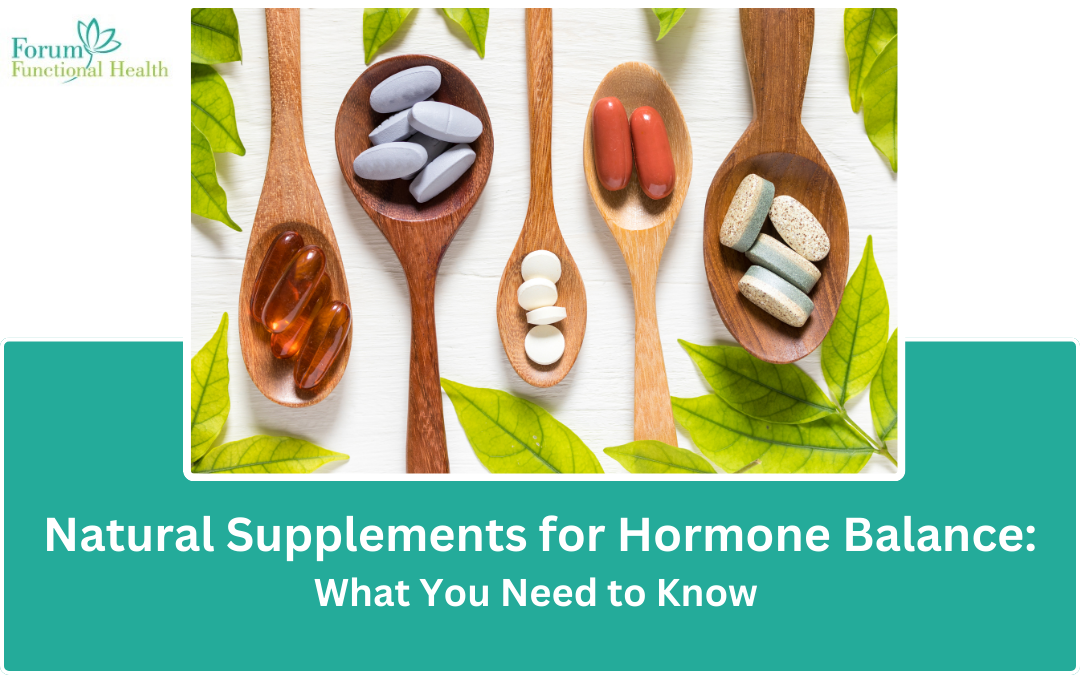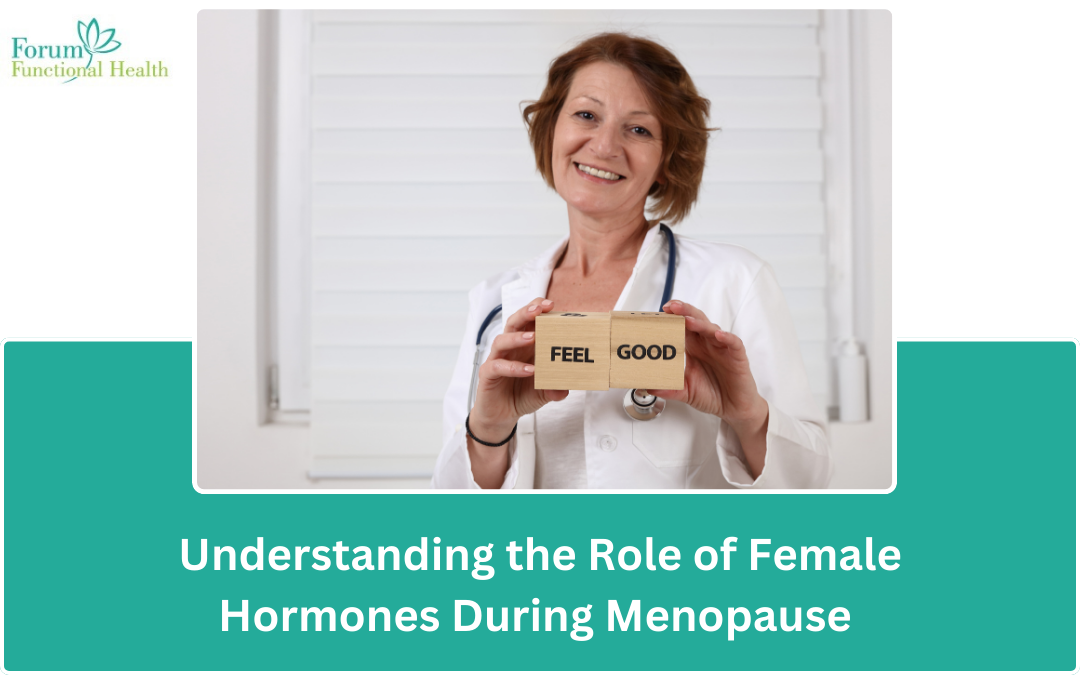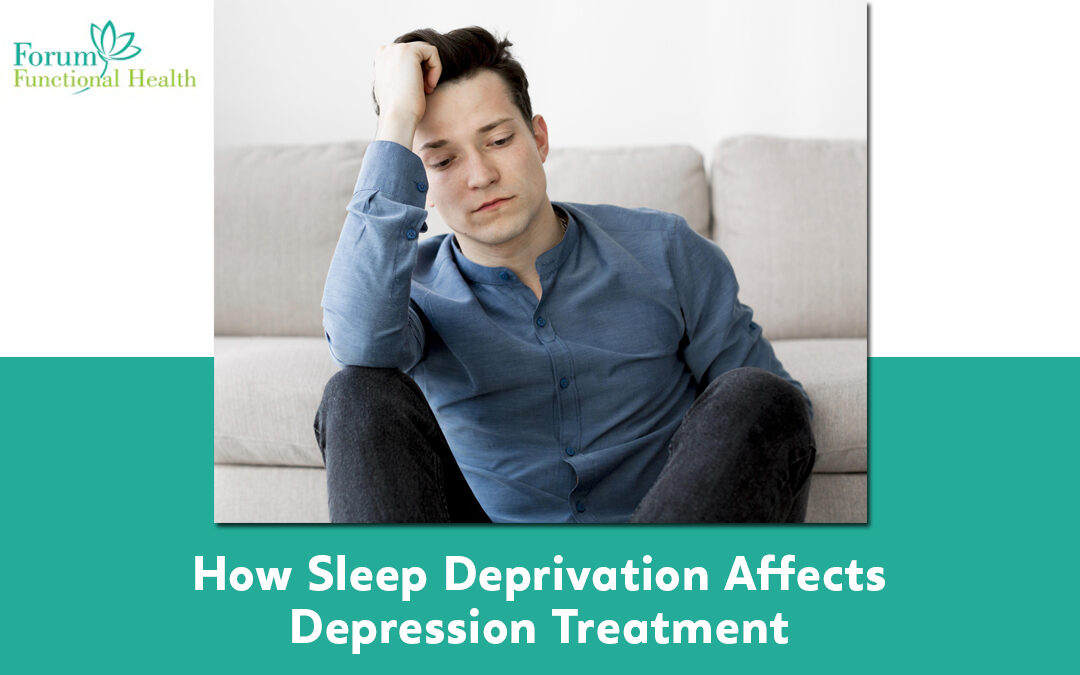Hormone Health

by Forum Functional Health Center | Apr 19, 2024 | Hormone Health
In the intricate web of the human body, hormones play a pivotal role in orchestrating various physiological processes. When these delicate messengers fall out of balance, it can lead to a myriad of symptoms and health issues. Understanding the signs of hormonal imbalance in females is crucial for timely intervention and effective treatment. Join us as we delve into the realm of hormonal health, exploring the symptoms, diagnosis, treatment options, and the role of Forum Functional Health Center in McKinney in restoring hormonal harmony.
Understanding Hormonal Imbalance:
Hormonal imbalance occurs when there is either an excess or deficiency of certain hormones in the body. In females, hormones such as estrogen, progesterone, testosterone, thyroid hormones, and cortisol play key roles in regulating menstrual cycles, mood, metabolism, and overall well-being. When these hormones are imbalanced, it can manifest in various ways, affecting both physical and emotional health.
Hormonal Imbalance Symptoms:
Irregular Menstrual Cycles: One of the hallmark signs of hormonal imbalance in females is irregular periods. This can include missed periods, unusually heavy or light bleeding, or erratic cycles.
Mood Swings: Hormonal fluctuations can wreak havoc on mood stability, leading to mood swings, irritability, anxiety, or depression.
Fatigue: Persistent fatigue or low energy levels, despite adequate rest, can indicate hormonal imbalance, particularly issues with thyroid hormones or cortisol.
Weight Changes: Sudden weight gain or difficulty losing weight despite efforts in diet and exercise can be a sign of hormonal imbalance, especially involving insulin or thyroid hormones.
Skin Issues: Hormonal imbalance may manifest in skin problems such as acne, dryness, or excessive oiliness.
Hair Changes: Thinning hair, hair loss, or excessive facial hair growth (hirsutism) can indicate hormonal disruptions.
Sleep Disturbances: Insomnia, difficulty falling asleep, or waking up frequently during the night can be linked to hormonal imbalance, particularly cortisol or melatonin imbalances.
Libido Changes: Fluctuations in libido, including decreased sex drive or discomfort during intercourse, can be attributed to hormonal imbalances.
Digestive Issues: Hormonal imbalances can contribute to digestive problems such as bloating, constipation, or diarrhea.
Cognitive Symptoms: Difficulty concentrating, memory problems, or brain fog may also be associated with hormonal imbalance, particularly involving estrogen or thyroid hormones.
Diagnosis of Hormonal Imbalance:
Diagnosing hormonal imbalance requires a comprehensive evaluation of symptoms, medical history, and laboratory tests. Forum Functional Health Center near McKinney specializes in personalized and integrative approaches to hormone health, offering advanced diagnostic testing to pinpoint hormonal imbalances accurately. Through blood tests, saliva tests, and other diagnostic modalities, healthcare providers at Forum Functional Health Center can identify specific hormone imbalances and develop tailored treatment plans.
Treatment for hormonal imbalance aims to restore hormonal equilibrium and alleviate symptoms. At Forum Functional Health Center, a multidisciplinary team of healthcare professionals collaborates to provide holistic and evidence-based treatment approaches. Depending on the underlying cause and individual needs, treatment options may include:
Hormone Replacement Therapy (HRT): HRT involves supplementing deficient hormones or rebalancing hormone levels using bioidentical hormones.
Lifestyle Modifications: Dietary changes, exercise routines, stress management techniques, and adequate sleep are integral components of hormone balance.
Nutritional Supplements: Targeted supplementation with vitamins, minerals, and herbs can support hormone production and metabolism.
Stress Reduction Techniques: Stress management strategies such as meditation, yoga, or mindfulness can help regulate cortisol levels and improve overall hormone balance.
Medications: In certain cases, medications may be prescribed to address specific hormonal imbalances or related symptoms.
Follow-up Monitoring: Regular follow-up visits and monitoring of hormone levels allow for adjustments to treatment plans and optimization of outcomes.
Conclusion:
Recognizing the signs of hormonal imbalance in females is the first step towards reclaiming hormonal harmony and optimizing overall health and well-being. At Forum Functional Health Center near McKinney, individuals can receive comprehensive evaluation, personalized treatment, and ongoing support to address hormonal imbalances effectively. By combining conventional medicine with integrative approaches, Forum Functional Health Center empowers individuals to embark on a journey towards hormonal balance and vitality. Don’t let hormonal imbalances dictate your quality of life. Take proactive steps or contact us for hormonal health today!
Read More:-Understanding How Hormonal Fluctuations Affect Mental Health

by Forum Functional Health Center | Apr 3, 2024 | Hormone Health
Hormones play a crucial role in regulating various bodily functions, from metabolism and mood to reproduction and sleep. When hormones are imbalanced, it can lead to a myriad of health issues, including weight gain, fatigue, mood swings, and reproductive issues. While conventional treatments are available, many individuals seek natural alternatives to restore hormonal balance. In this comprehensive guide, we’ll explore natural supplements for hormone balance, their benefits, and what you need to know before incorporating them into your wellness routine.
Understanding Hormonal Imbalance
Before delving into natural supplements, it’s essential to understand what hormonal imbalance entails. Hormonal imbalance occurs when there’s either too much or too little of a particular hormone in the bloodstream. This imbalance can be caused by various factors, including stress, diet, lifestyle, genetics, and underlying medical conditions. Common hormones affected by imbalance include estrogen, progesterone, testosterone, thyroid hormones, and cortisol.
Benefits of Natural Supplements
Natural supplements offer a holistic approach to hormone balance, targeting the root cause of imbalance while minimizing side effects. These supplements are derived from natural sources such as herbs, vitamins, minerals, and plant extracts, making them gentler on the body compared to synthetic hormones. Some benefits of natural supplements for hormone balance include
Regulating Hormone Production: Certain supplements can help regulate hormone production, ensuring optimal levels in the body.
Supporting Endocrine System: Natural supplements support the endocrine system, which is responsible for hormone production and regulation.
Balancing Menstrual Cycles: For women, natural supplements can help regulate menstrual cycles and alleviate symptoms of PMS and menopause.
Improving Mood and Energy: Balancing hormones can improve mood, energy levels, and overall well-being.
Enhancing Metabolism: Some supplements support metabolism, aiding in weight management and reducing the risk of metabolic disorders.
Supporting Reproductive Health: Certain supplements can support reproductive health in both men and women, improving fertility and sexual function.
Popular Natural Supplements
Vitamin D: Known as the sunshine vitamin, vitamin D plays a crucial role in hormone regulation, particularly in mood and immune function.
Magnesium: Magnesium supports hundreds of enzymatic processes in the body, including hormone production and stress management.
Omega-3 Fatty Acids: Found in fatty fish like salmon and flaxseeds, omega-3s help reduce inflammation and support hormonal balance.
Adaptogenic Herbs: Adaptogens like ashwagandha, rhodiola, and holy basil help the body adapt to stress, thereby balancing cortisol levels.
Vitamin B Complex: B vitamins are essential for energy production, neurotransmitter synthesis, and hormone regulation.
Evening Primrose Oil: Rich in gamma-linolenic acid (GLA), evening primrose oil supports hormonal balance, particularly in women experiencing menstrual irregularities.
Chasteberry (Vitex): Chasteberry has been traditionally used to support hormonal balance, particularly in women with PMS and irregular menstrual cycles.
Maca Root: Maca root is known for its adaptogenic properties and is believed to support hormone balance, energy levels, and libido.
Considerations Before Use
While natural supplements offer promising benefits, it’s essential to approach them with caution and consult with a healthcare professional before use, especially if you have underlying health conditions or are taking medications. Consider the following before incorporating natural supplements into your routine
Quality and Purity: Choose supplements from reputable brands that adhere to quality standards and undergo third-party testing for purity and potency.
Dosage: Follow recommended dosage guidelines provided by healthcare professionals or the supplement manufacturer.
Potential Interactions: Some supplements may interact with medications or exacerbate certain health conditions. Always disclose all supplements to your healthcare provider.
Patience and Consistency: Natural supplements may take time to exert their effects, so be patient and consistent with your regimen.
Lifestyle Factors: Remember that supplements are not a substitute for a healthy lifestyle. Incorporate balanced nutrition, regular exercise, stress management, and adequate sleep for optimal results.
Forum Functional Health Care
At Forum Functional Health Care, we understand the importance of hormonal balance in achieving overall wellness. Our team of experienced healthcare professionals offers personalized consultations and comprehensive treatment plans tailored to your unique needs. Whether you’re experiencing hormonal imbalances, chronic health issues, or seeking preventive care, we’re dedicated to supporting your journey to optimal health and vitality. Contact us today to schedule your consultation and take the first step towards a healthier, balanced life.

by Forum Functional Health Center | Mar 18, 2024 | Hormone Health
Menopause marks a significant transition in a woman’s life, characterized by the cessation of menstrual cycles and the onset of various physical and emotional changes. At the heart of this transformative phase lie fluctuations in female hormones, namely estrogen and progesterone, which play pivotal roles in regulating numerous bodily functions. Understanding the intricate interplay of theses hormone during menopause is key to managing its symptoms effectively and promoting overall well-being.
The Role of Female Hormones during Menopause
Menopause typically occurs between the ages of 45 and 55, signaling the end of reproductive capacity. Central to this process is the decline in ovarian function, leading to decreased production of estrogen and progesterone. These hormonal shifts give rise to a myriad of symptoms, ranging from hot flashes and night sweats to mood swings and vaginal dryness.
Estrogen, known as the primary female sex hormone, exerts widespread effects on the body, influencing bone health, cardiovascular function, cognitive function, and more. As estrogen levels decline during menopause, women may experience bone loss, increased risk of heart disease, cognitive changes, and urogenital issues.
Progesterone, another key hormone, helps regulate the menstrual cycle and supports pregnancy. During menopause, progesterone production also dwindles, contributing to irregular periods and other symptoms associated with hormonal imbalance.
Managing Menopausal Symptoms naturally
while menopause is a natural phase of life, the associated symptoms can significantly impact quality of life for many women. Fortunately, several strategies can help alleviate these symptoms and support overall health during this transitional period.
1. Lifestyle Modifications
Healthy Diet: Emphasize a balanced diet rich in fruits, vegetables, whole grains, lean proteins, and healthy fats. Incorporate foods high in calcium and vitamin D to support bone health.
Regular Exercise: Engage in regular physical activity, including aerobic exercise, strength training, and flexibility exercises, to improve mood, alleviate stress, and maintain bone density.
Stress Management: Practice relaxation techniques such as deep breathing, meditation, yoga, or tai chi to reduce stress levels and promote emotional well-being.
2. Herbal Remedies and Supplements:
Black Cohosh: Widely used for relieving hot flashes and other menopausal symptoms, black cohosh is a botanical remedy with estrogen-like properties.
Soy Isoflavones: Found in soybeans and soy products, isoflavones may help alleviate hot flashes and support cardiovascular health.
Dong Quai: Used in traditional Chinese medicine, dong quai is believed to balance hormone levels and ease menopausal symptoms.
Omega-3 Fatty Acids: Omega-3 supplements, derived from sources like fish oil or flaxseed oil, may help reduce inflammation and support heart health during menopause.
3. Hormone Replacement Therapy (HRT)
HRT involves supplementing estrogen or estrogen-progestin combinations to alleviate menopausal symptoms. While effective for symptom relief, HRT carries certain risks and is not suitable for all women. It’s essential to discuss the potential benefits and risks with a healthcare provider.
Seeking Support at Forum Functional Health Center
At Forum Functional Health Center, we understand the unique challenges women face during menopause and offer comprehensive support to help them navigate this transitional phase with confidence and vitality. Our team of experienced healthcare professionals provides personalized guidance and evidence-based interventions to address menopausal symptoms holistically.
Through a blend of natural approaches, including nutritional counseling, lifestyle modifications, targeted supplementation, and personalized exercise regimens, we empower women to optimize their health and well-being during menopause and beyond. Our integrative approach considers the individual needs and preferences of each patient, ensuring tailored solutions that prioritize safety, efficacy, and long-term health outcomes.
Whether you’re seeking relief from hot flashes, support for bone health, or guidance on hormone replacement options, our team is here to support you every step of the way. Together, we’ll embark on a journey towards renewed vitality, enhanced resilience, and vibrant health during this transformative stage of life.
Understanding the role of female hormones during menopause is essential for effectively managing its symptoms and promoting overall health and well-being. By adopting a holistic approach that encompasses lifestyle modifications, herbal remedies, supplements, and personalized support from healthcare professionals like those at Forum Functional Health Center, women can embrace menopause as a natural transition and thrive with vitality and resilience.

by Forum Functional Health Center | Mar 2, 2024 | Hormone Health
Maintaining optimal health involves various factors, and hormonal balance plays a crucial role in overall well-being. Hormones act as messengers in the body, regulating essential functions such as metabolism, mood, reproductive health, and more. However, hormonal imbalances can lead to a wide range of health issues. Regular hormone testing is essential for identifying imbalances early and taking proactive steps to maintain overall health.
Understanding Hormonal Balance
Hormones are chemical messengers produced by various glands in the endocrine system. These include glands such as the thyroid, adrenal, pituitary, pancreas, and reproductive organs. Hormones regulate numerous bodily functions, including metabolism, growth and development, mood, sleep, and reproductive health.
Common Hormonal Imbalances: Several factors can disrupt hormonal balance, including stress, poor diet, and lack of exercise, environmental toxins, and certain medical conditions.
Thyroid Imbalance: The thyroid gland produces hormones that regulate metabolism. An underactive or overactive thyroid can lead to symptoms such as fatigue, weight gain or loss, and changes in mood.
Adrenal Imbalance: The adrenal glands produce hormones such as cortisol, which help the body respond to stress. Chronic stress can lead to adrenal fatigue or dysfunction, resulting in symptoms like fatigue, anxiety, and sleep disturbances.
Sex Hormone Imbalance: Imbalances in sex hormones such as estrogen, progesterone, and testosterone can affect reproductive health, mood, libido, and overall well-being. Symptoms may include irregular menstrual cycles, infertility, mood swings, and decreased sex drive.
Importance of Regular Hormone Testing
Regular hormone testing is essential for several reasons
Early Detection of Imbalances: Hormonal imbalances often develop gradually and may not cause noticeable symptoms initially. Regular testing allows for early detection, enabling prompt intervention before imbalances worsen and lead to significant health issues.
Personalized Treatment: Once hormonal imbalances are identified, healthcare providers can develop personalized treatment plans tailored to individual needs. This may include lifestyle modifications, dietary changes, hormone replacement therapy, or other interventions.
Prevention of Health Complications: Untreated hormonal imbalances can increase the risk of various health complications, including cardiovascular disease, osteoporosis, diabetes, and reproductive disorders. Regular testing and timely intervention can help prevent these complications.
Monitoring Treatment Effectiveness: For individuals undergoing hormone therapy or other interventions to address imbalances, regular testing allows healthcare providers to monitor treatment effectiveness and make adjustments as needed to optimize outcomes.
Methods of Hormone Testing
Several methods are available for hormone testing, including blood tests, saliva tests, urine tests, and specialized functional medicine tests. Each method has its advantages and may be used depending on the specific hormones being assessed and individual preferences.
Blood Tests: Blood tests are commonly used to measure hormone levels in the body. They provide a snapshot of hormone levels at a specific point in time and can assess various hormones, including thyroid hormones, sex hormones, cortisol, and insulin.
Saliva Tests: Saliva tests measure the levels of free, unbound hormones in saliva samples. This method is often used to assess cortisol levels throughout the day and can provide valuable insights into adrenal function and stress response.
Urine Tests: Urine tests measure hormone metabolites excreted in urine, providing information about hormone levels and metabolism over a longer period than blood or saliva tests. This method is particularly useful for assessing estrogen metabolism and hormone balance.
Functional Medicine Tests: Functional medicine tests may include comprehensive hormone panels that assess multiple hormones and biomarkers associated with hormonal balance, inflammation, and other factors influencing health. These tests offer a more holistic approach to evaluating overall wellness.
Maintaining hormonal balance is essential for overall health and well-being. Regular hormone testing is a valuable tool for identifying imbalances early, personalizing treatment approaches, and preventing health complications. Whether through blood tests, saliva tests, urine tests, or functional medicine tests, monitoring hormone levels regularly can empower individuals to take proactive steps towards optimizing their health.
Forum Functional Health serves as a central hub for individuals passionate about proactive health management. Members can share their experiences with hormone testing, discuss treatment strategies, and access resources to support their wellness journey. Engage with like-minded individuals, learn from experts, and stay informed about the latest advancements in hormone optimization. Join the forum today to take control of your health and well-being.

by Forum Functional Health Center | Feb 21, 2024 | Depression, Hormone Health
The relationship between sleep and depression is one that cannot be understated. Sleep deprivation, whether chronic or occasional, can significantly exacerbate symptoms of depression and hinder effective management strategies. Understanding the profound impact of sleep deprivation on depression management is crucial for individuals striving to improve their mental well-being.
The Link between Sleep and Depression
To comprehend the impact of sleep deprivation on depression management, it’s essential to grasp the intricate interplay between sleep and mood regulation. Sleep plays a vital role in emotional processing, cognitive function, and overall mental health. When deprived of adequate sleep, the brain’s ability to regulate emotions becomes compromised, leading to increased vulnerability to negative mood states, such as depression.
Effects of Sleep Deprivation on Depression Symptoms
Sleep deprivation can intensify various symptoms of depression, making it more challenging for individuals to cope with their condition effectively. Common effects of sleep deprivation on depression symptoms include heightened irritability, persistent sadness, decreased motivation, and impaired concentration. Moreover, insufficient sleep can exacerbate feelings of hopelessness and exacerbate suicidal ideation, posing significant risks to individuals struggling with depression.
Biological Mechanisms at Play
The impact of sleep deprivation on depression management extends beyond mere psychological factors, delving into intricate biological mechanisms within the body. Disruptions in sleep patterns can dysregulate neurotransmitter activity, particularly serotonin and dopamine, which are crucial for mood regulation. Additionally, sleep deprivation can trigger inflammatory responses in the body, contributing to neurobiological changes associated with depression.
The Vicious Cycle of Sleep Deprivation and Depression
One of the most challenging aspects of managing depression amidst sleep deprivation is the creation of a vicious cycle wherein each exacerbates the other. Individuals experiencing depression may find it difficult to fall asleep or maintain restful sleep due to racing thoughts, anxiety, or intrusive negative emotions. Conversely, insufficient sleep can worsen depressive symptoms, leading to a continuous cycle of sleep disturbances and mood disturbances.
Strategies for Managing Sleep Deprivation and Depression
While navigating the complex relationship between sleep deprivation and depression can be daunting, several strategies can help individuals better manage their symptoms:
Establishing a Consistent Sleep Routine: Prioritize regular sleep schedules, aiming for seven to nine hours of quality sleep each night.
Creating a Relaxing Sleep Environment: Designate your bedroom as a tranquil space conducive to restorative sleep, minimizing exposure to electronic devices and stimulating activities before bedtime.
Practicing Relaxation Techniques: Engage in relaxation practices such as deep breathing exercises, progressive muscle relaxation, or mindfulness meditation to alleviate stress and promote relaxation before sleep.
Seeking Professional Support: Consult with a healthcare provider or mental health professional to explore personalized treatment options, including therapy, medication, or alternative interventions tailored to address both sleep and mood disturbances.
The Importance of Comprehensive Assessment and Treatment
While antidepressants may be prescribed as a treatment option for depression, it’s crucial to acknowledge the limitations of this approach without addressing underlying root causes. At Forum Functional Health Center, we prioritize comprehensive assessment and treatment of depression by evaluating three main body systems: hormonal, gastrointestinal, and detoxification.
Each of these systems plays a pivotal role in influencing mood and overall well-being, and dysfunction within one can significantly impact the others. By addressing underlying imbalances and deficiencies, we aim to restore holistic health and empower individuals to reclaim their lives from the grips of depression.
If you’re struggling with depression and seeking a comprehensive approach to address underlying factors contributing to your symptoms, we invite you to schedule an appointment at our office. Our dedicated team at Forum Functional Health Center is committed to helping you achieve optimal health, happiness, and a life free from the burdens of depression and its accompanying challenges.

by Forum Functional Health Center | Feb 14, 2024 | Hormone Health
Hormones serve as vital messengers in our bodies, overseeing processes like mood, stress response, and cognition. Despite their pivotal role in overall health, hormonal fluctuations can heavily influence mental well-being. In this piece, we’ll examine how these fluctuations shape mental health patterns and discuss effective management strategies.
Understanding Hormonal Fluctuations
Hormonal fluctuations are a natural part of life, influenced by various factors like puberty, menstruation, pregnancy, menopause, and stress. These fluctuations cause hormone levels to vary significantly, resulting in alterations in mood, energy levels, and cognitive function.
During puberty, the body undergoes significant hormonal changes as it transitions from childhood to adulthood. Hormonal fluctuations during this period can lead to mood swings, increased energy levels, and changes in cognitive abilities.
Similarly, menstruation, pregnancy, and menopause are characterized by hormonal fluctuations that can impact mental well-being. Hormone levels fluctuate during these phases, affecting mood, energy levels, and cognitive function. Additionally, stress can exacerbate hormonal imbalances, further influencing mental health patterns.
Impact on Mental Health
Hormonal fluctuations can profoundly affect mental health, contributing to mood swings, anxiety, depression, irritability, and cognitive difficulties. For instance, fluctuations in estrogen and progesterone levels during the menstrual cycle can cause premenstrual syndrome (PMS) symptoms, including mood changes and irritability. Similarly, hormonal changes during menopause can lead to mood disturbances and increased risk of depression.
Managing Hormonal Fluctuations for Better Mental Health
While hormonal fluctuations are a natural part of life, there are strategies to manage them effectively and support mental well-being:
Healthy Lifestyle: Adopting a healthy lifestyle, including regular exercise, balanced diet, adequate sleep, and stress management techniques, can help regulate hormone levels and improve mood stability.
Stress Reduction: High levels of stress can exacerbate hormonal imbalances and impact mental health. Practicing relaxation techniques such as deep breathing, meditation, and yoga can help reduce stress and promote hormonal balance.
Nutritional Support: Consuming a diet rich in fruits, vegetables, whole grains, and lean proteins can provide essential nutrients that support hormone production and regulation. Additionally, certain supplements like omega-3 fatty acids and vitamin D may help alleviate symptoms associated with hormonal fluctuations.
Medication: In some cases, healthcare providers may prescribe medications such as hormonal contraceptives or hormone replacement therapy to regulate hormone levels and alleviate symptoms.
Therapy: Therapy, such as cognitive-behavioral therapy (CBT) or mindfulness-based therapy, can be beneficial for managing stress, anxiety, and depression associated with hormonal fluctuations.
Hormonal fluctuations can have a significant impact on mental health, leading to mood disturbances, anxiety, depression, and cognitive difficulties. However, by understanding the relationship between hormones and mental health and adopting strategies to manage fluctuations effectively, individuals can support their overall well-being.
Forum Functional Health Cente is dedicated to comprehending the intricate relationship between hormones and mental health. Our skilled healthcare experts specialize in developing personalized treatment plans designed to target hormonal imbalances and bolster mental well-being. Whether you’re encountering symptoms linked to hormonal fluctuations or pursuing preventive care, our team is committed to assisting you in attaining optimal health and vitality.






